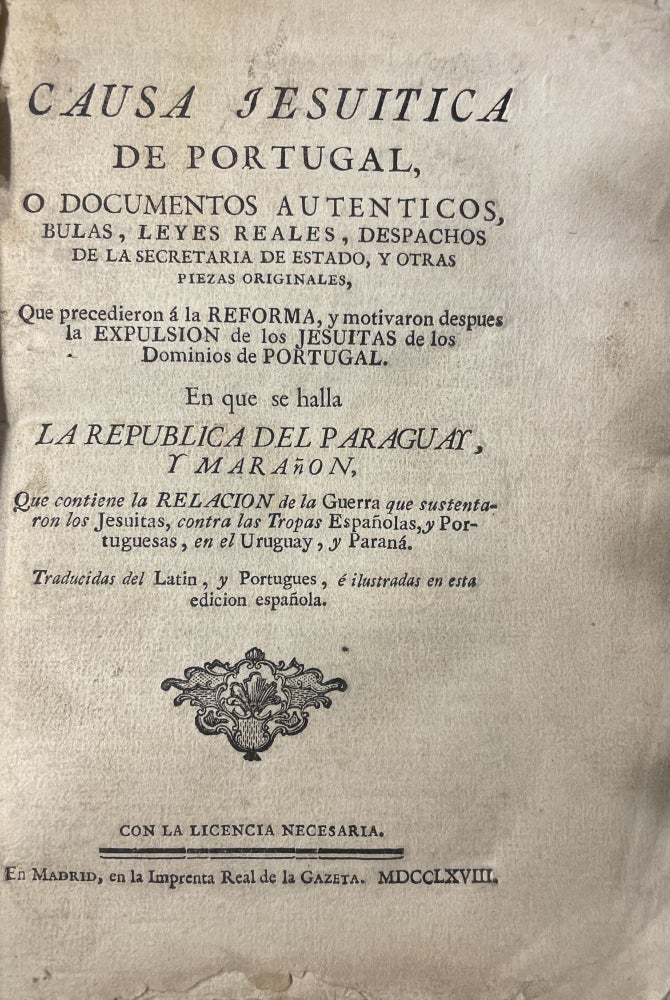Causa jesuitica de Portugal o documentos autenticos, o documentos autenticos, bulas, leyes reales, despachos de la Secretaria de Estado, y otras piezas originales, Que precedieron á la Reforma, y motivaron despues la Expulsion de los Jesuitas de los dominios de Portugal. En que se halla la Republica del Paraguay, y Marañon, Que contiene la Relacion de la Guerra que sustentaron los Jesuitas, contra las Tropas Españolas, y Portuguesas, en el Uruguay, y Paraná. Traducidas del Latin, y Portugues, é ilustradas en esta edicion española.
En Madrid: en la Imprenta Real de la Gazeta, MDCCLXVIII [1768]. First edition. In 19th century, printed, yellow paper. [8] XXVIII, 172 p. Untrimmed, thus pages chipped. Stains occasionally. Corners bumped. Binding worn, torn. Overall in very good condition.
A thorough and important compilation of documents related to the effects of the Treaty of Madrid of 1750, and the Guaraní War, which events later proved to be the beginning of the Jesuit’s debacle in the Spanish colonies.
The Treaty of Madrid was an agreement between Spain and Portugal which, besides other aspects, was an attempt of the Spanish Crown to eliminate the economic threat of the contraband trade around the Ríó de la Plata area by exchanging lands and establishing new boundaries between Portuguese and Spanish territories. Seven Jesuit reductions, some of the most populous ones in South America, were to come under Portuguese control, thus Madrid instructed to relocate them to Spanish soil. The indigenous Guaraní people of these Misiones refused to comply with the order of transfer and began an armed rebellion against both the Spanish and Portuguese garrisons which terminated at the battle of Caiboaté in 1756, where the Guaranis were routed, many killed, and the joint Spanish-Portuguese army occupied the seven missions. (Bacigalupo 1979)
The author, Bernardo Ibáñez de Echavarri, was twice expelled from the Jesuit order, for the second time in 1761 after some years spent in the missions and Buenos Aires, where obtaining first-hand information about the aftermath of the Treaty and the Guarani War.
Ibáñez is best known for his vitriolic book, El Reyno jesuítico del Paraguay (1768; translated to several languages), and is generally credited as one of the most harmful authors of the order. In his works, which essentially are a synthesis of the charges that the Crown employed to justify the expulsion of 1767, Ibáñez accuses the Jesuits of arrogance and corruption, claims that they oppose the Crown, act independently from the colonial authorities, sabotage the Treaty of Mardin, and arm and incite the Indians to rebel. In El Reyno jesuítico he concludes that due to the fact that the Jesuits usurped completely the Crown’s sovereignty, they should be expelled from the missions. In the present book, Causa jesuitica, he affirms the same claims with various documents, among them a diary written by the Jesuit missionary Tadeo Xavier Henis (1711–1767) during the Guaraní war, and the letters that the Portuguese commissioner Gomes Freire de Andrade (Conde de Bobadela; 1685–1763) wrote to Lisbon in relation to those upheavals. (Bacigalupo 1979)
Ibáñez died unexpectedly in 1762 while in Madrid, his papers and manuscripts were passed to Ricardo Wall, then Prime Minister (Secretario de Estado) of Spain, and published posthumously.
Scarce in the market, no copy in RBH within the last thirty years (Sotheby’s, 1994).
Ref.: Palau 50413; Medina (BHA) 4290; Sabin 11576; Borba de Moraes (1983), p. 170
Literature: Bacigalupo, M. F. (1979). Bernardo Ibáñez de Echavarri and the Image of the Jesuit Missions of Paraguay. The Americas, 35(4), 475–494. https://doi.org/10.2307/981019.
Scarce first edition of this important text related to the suppression of the Jesuits in South America, a collection of documents illustrating the history of the last years of the Jesuit missions in Paraguay and Marañon.
Price: €4,500.00

